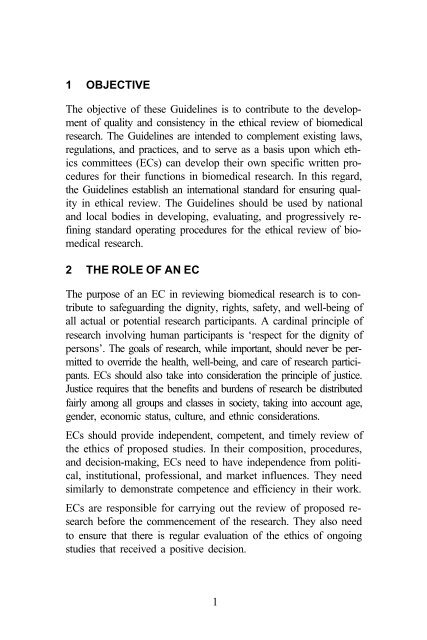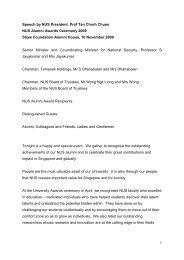Operational Guidelines for Ethics Committees That Review ...
Operational Guidelines for Ethics Committees That Review ...
Operational Guidelines for Ethics Committees That Review ...
Create successful ePaper yourself
Turn your PDF publications into a flip-book with our unique Google optimized e-Paper software.
1 OBJECTIVE<br />
The objective of these <strong>Guidelines</strong> is to contribute to the development<br />
of quality and consistency in the ethical review of biomedical<br />
research. The <strong>Guidelines</strong> are intended to complement existing laws,<br />
regulations, and practices, and to serve as a basis upon which ethics<br />
committees (ECs) can develop their own specific written procedures<br />
<strong>for</strong> their functions in biomedical research. In this regard,<br />
the <strong>Guidelines</strong> establish an international standard <strong>for</strong> ensuring quality<br />
in ethical review. The <strong>Guidelines</strong> should be used by national<br />
and local bodies in developing, evaluating, and progressively refining<br />
standard operating procedures <strong>for</strong> the ethical review of biomedical<br />
research.<br />
2 THE ROLE OF AN EC<br />
The purpose of an EC in reviewing biomedical research is to contribute<br />
to safeguarding the dignity, rights, safety, and well-being of<br />
all actual or potential research participants. A cardinal principle of<br />
research involving human participants is ‘respect <strong>for</strong> the dignity of<br />
persons’. The goals of research, while important, should never be permitted<br />
to override the health, well-being, and care of research participants.<br />
ECs should also take into consideration the principle of justice.<br />
Justice requires that the benefits and burdens of research be distributed<br />
fairly among all groups and classes in society, taking into account age,<br />
gender, economic status, culture, and ethnic considerations.<br />
ECs should provide independent, competent, and timely review of<br />
the ethics of proposed studies. In their composition, procedures,<br />
and decision-making, ECs need to have independence from political,<br />
institutional, professional, and market influences. They need<br />
similarly to demonstrate competence and efficiency in their work.<br />
ECs are responsible <strong>for</strong> carrying out the review of proposed research<br />
be<strong>for</strong>e the commencement of the research. They also need<br />
to ensure that there is regular evaluation of the ethics of ongoing<br />
studies that received a positive decision.<br />
1
















